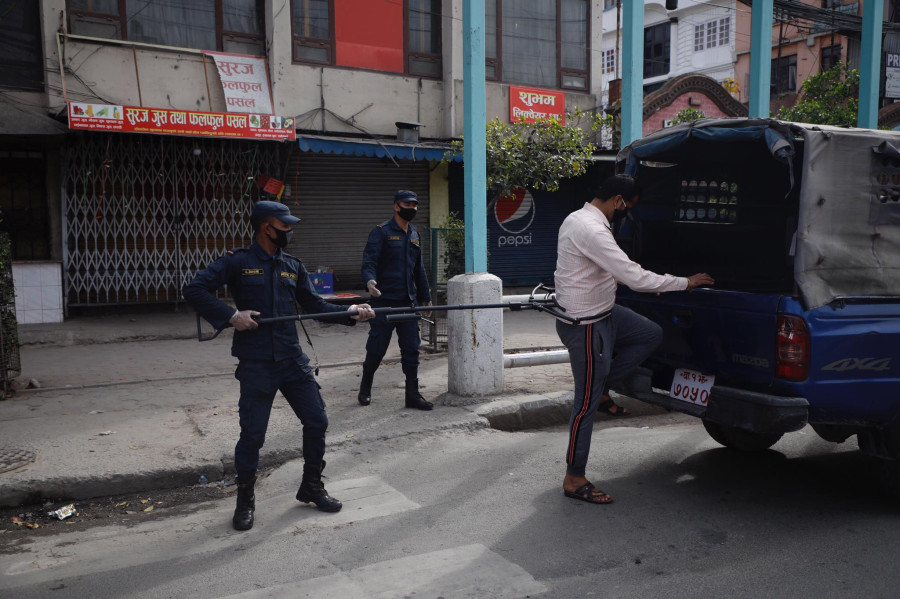Police in the past six days have taken action against over 2,417 people in Kathmandu Valley alone for defying lockdown, a measure that was put in place effective from Tuesday to prevent the spread of Covid-19.
Even on Sunday as of noon, police had caught 1,695 people for being outside during the lockdown period, Superintendent of Police Shyam Lal Gyawali, spokesperson for the Metropolitan Police Office, Ranipokhari, told the Post.
On day one of the nationwide lockdown, police were more lenient when enforcing the containment order. People found outside their homes were let off with a warning.
Gyawali said the police had to become strict about enforcing the lockdown, as many people were not taking the matter seriously.
“We started by detaining the lockdown violators and taking them to the nearest police station. But we had to change this approach because locking up people meant putting them in risk of contagion,” Gyawali said. “So we have started the on-spot punishment method, where we detain lockdown violators for two hours wherever they are caught. We let them go after a stern warning.”
Meanwhile, to maintain social distancing while detaining lockdown violators, police in some parts of Kathmandu are using a clamp attached to a rod.
The device has come handy as it prevents police officers from coming into contact with a person who could be infected with Sars-CoV-2, the novel coronavirus that causes Covid-19.
With the increase in the cases of Covid-19, Nepal Police has shown concern regarding the safety of its personnel.
Nepal has so far reported five cases of Covid-19, all of them imported from overseas.
To stop a serious outbreak of the disease, the government has halted all commercial flights, international and domestic, as well as overland transport service within the country. It is also expected to extend the lockdown period, which was initially enforced for a week.
Frequently asked questions about the coronavirus outbreak
UPDATED as of September 22, 2020
What is Covid-19?
Covid-19, short for coronavirus disease, is an illness caused by the coronavirus SARS-CoV-2, short for severe acute respiratory syndrome coronavirus 2. Common symptoms of the disease include fever, dry cough, fatigue, shortness of breath and breathing difficulties. In severe cases, the infection can cause pneumonia, severe acute respiratory syndrome, kidney failure and even death.
How contagious is Covid-19?
Covid-19 can spread easily from person to person, especially in enclosed spaces. The virus can travel through the air in respiratory droplets produced when a sick person breathes, talks, coughs or sneezes. As the virus can also survive on plastic and steel surfaces for up to 72 hours and on cardboard for up to 24 hours, any contact with such surfaces can also spread the virus. Symptoms take between two to 14 days to appear, during which time the carrier is believed to be contagious.
Where did the virus come from?
The virus was first identified in Wuhan, China in late December. The coronavirus is a large family of viruses that is responsible for everything from the common cold to Middle East Respiratory Syndrome (MERS) and Severe Acute Respiratory Syndrome (SARS). After an initial outbreak in Wuhan that spread across Hubei province, eventually infecting over 80,000 and killing more than 3,000, new infection rates in mainland China have dropped. However, the disease has since spread across the world at an alarming rate.
What is the current status of Covid-19?
The World Health Organisation has called the ongoing outbreak a “pandemic” and urged countries across the world to take precautionary measures. Covid-19 has spread to 213 countries and territories around the world and infected more than 31,405,983 people with 967,505 deaths and 22,990,260 recoveries. In South Asia, India has reported the highest number of infections at 5,557,573 with 88,943 deaths. While Pakistan has reported 306,304 confirmed cases with 6,420 deaths. Nepal has so far reported 65,276 cases with 427 deaths.
How dangerous is the disease?
The mortality rate for Covid-19 is estimated to be 3.6 percent, but new studies have put the rate slightly higher at 5.7 percent. Although Covid-19 is not too dangerous to young healthy people, older individuals and those with immune-compromised systems are at greater risk of death. People with chronic medical conditions like heart disease, diabetes and lung disease, or those who’ve recently undergone serious medical procedures, are also at risk.
How do I keep myself safe?
The WHO advises that the most important thing you can do is wash your hands frequently with soap and water for at least 20 seconds or use hand sanitizers with at least 60 percent alcohol content. Avoid touching your eyes, nose and mouth with unclean hands. Clean and disinfect frequently used surfaces like your computers and phones. Avoid large crowds of people. Seek medical attention if symptoms persist for longer than a few days.
Is it time to panic?
No. The government has imposed a lockdown to limit the spread of the virus. There is no need to begin stockpiling food, cooking gas or hand sanitizers. However, it is always prudent to take sensible precautions like the ones identified above.





 8.75°C Kathmandu
8.75°C Kathmandu















